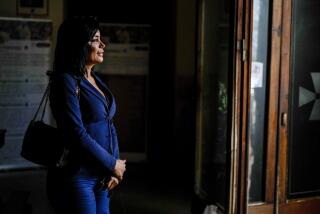Revered Reverend : Religion: Pastor Lisa R. Golden’s efforts to help the poor in Porterville have earned her respect at St. John’s Episcopal Church and School in Rancho Santa Margarita.
- Share via
RANCHO SANTA MARGARITA — With her Isuzu Amigo loaded with bags of donated food and clothing, the Rev. Lisa R. Golden headed through the valley of red-tiled roofs and neatly clipped lawns to the impoverished canyon shantytown of Porterville.
While most of the residents of Porterville have been evicted in recent weeks by landowner Sam Porter, those remaining were grateful to see Golden and her fellow church member Fernando Pedraza.
“Help yourself, help yourself,” Pedraza called out in Spanish to a group of women standing near the isolated entrance of the 235-acre Trabuco Canyon ranch, located only minutes away from Golden’s home base of St. John’s Episcopal Church and School in Rancho Santa Margarita. “Would you like some clothes?”
As the two continued down the pitted dirt road, Golden had to smile when she spotted her old blue living room easy chair sitting under the ramshackle patio of nursery worker Benito Salgado and his wife, Paula Bahena.
On this day, the young pastor had gifts of food, towels and stuffed animals for Bahena and her 8-month-old daughter, Juliayna, who was delivered in a nearby hospital thanks to the financial help of St. John’s congregation. “How do you say bear-- oso ?” Golden asked the baby, handing a teddy bear to Bahena.
When 29-year-old Golden, fresh out of a Virginia seminary, came to the young but growing and affluent St. John’s Episcopal Church and School in the spring of 1991, the last thing she expected to find so close to her new home was a shantytown lacking hot water, electricity and other necessities.
Since that discovery, her efforts to help the poor and needy have not stopped in Porterville, which before the evictions in August had a population of more than 100 Mexican immigrants.
In the past year, Golden has helped organize social service activities involving adults and youths of the church, spanning from the “shadow community” of poor residents in South County to Compton, Pasadena and the Pyramid Lake Paiute Indian Reservation in Nevada. Thanks to a suggestion made by Pedraza in January, the church now offers English classes two nights every week to more than 150 Spanish-speaking adults and one Vietnamese family.
“Porterville was a spark for my ministry here,” Golden said. “People saw the need and the response was incredible. I’m grateful to be a focal point where people can come to get a response. But it’s the community that responds.
“I’ve never been involved in such a warm parish,” she added. “People genuinely care about each other.”
One of eight women Episcopal priests in Orange County, Golden’s inspiring style is probably best described by her RAD REVD license plate, a tag dreamed up by members of the youth group she formed last summer. Most of the time she is simply known as “Pastor Lisa.”
Parishioners say her energy and ability to reach the youth of the congregation comes as a perfect complement to the work of senior church leaders, the Rev. Richard B. Harms and the Rev. Ernest D. Sillers, who have overseen the day-to-day development and construction of the 6-year-old church and school. In addition to her work as a pastor, Golden also serves as dean of students for the 800 pupils at the private school.
“She’s got an excellent rapport with the youth,” said Carl Chapman, junior warden of the church. “She’s got more energy than any five people I know combined. I suspect she works 75 to 80 hours a week. She’s just a loving, outgoing person. And it shows.”
Like her unexpected journey into a more social service-oriented ministry, Golden’s decision to become a priest was equally unplanned. She had graduated from Syracuse University in New York in 1984 with a degree in communications, settled into married life and started a public relations career in northern Virginia when a young, newly ordained priest in her parish suggested she get into the ministry.
“It was like being hit with a lightening bolt,” she recalled. “I started laughing.”
But her husband, Keith, a computer consultant, did not think it was such a crazy idea and encouraged her to make the change.
In 1988, Golden entered the Virginia Theological Seminary. Ironically, it was in Virginia at a conference for Episcopal school officials that Golden met Harms and learned about the job opening in Rancho Santa Margarita.
Golden, who was raised as a Roman Catholic, said she became involved in the Episcopal Church while studying for a year in England. “I went into an Anglican service and noticed the service was identical to a Catholic Mass, but the church was very different,” she said.
The differences were even more pronounced when she returned home to an Episcopalian service in Syracuse, where the presence of two women priests and an ethnically diverse congregation made her feel immediately more comfortable. “I felt like I had come home,” she said.
Although she had some doubts, Golden said her resolve to make the conversion strengthened after learning her paternal grandmother had been an Episcopalian and after receiving a blessing from a sympathetic Catholic priest who understood that her struggle involved the institution, not God.
While Golden said she does not consider herself a “feminist,” she feels gifted to be able to accept an ordained position that until 1976 was only available to men.
“I’ve been shocked by how I’ve been accepted,” she said. “I didn’t realize the chords I was striking in other women.
“Women come up to me and say all the time that they are so thrilled to have a woman behind the altar. It’s not just me, it’s just having a woman up there.”
Despite such acceptance, Golden said there have been times of doubt. “I struggled at first, asking myself, ‘Am I right? Can I as a woman be a priest?’ ” she said.
But the answer to that question came in the form of Scriptures, in the belief that both men and women were created in the image of God. “When there’s a male and a female behind the altar, that’s a more complete picture of God,” Golden said.
Looking back on her years of Catholic catechism as a youth, and in her growing involvement in the church during college, Golden said she now realizes she had been preparing for the priesthood her whole life.
“I’m just so grateful to have felt a call and to have an opportunity to serve,” she said. “People struggle their whole lives to find what I have found. I’m just thankful to God and look forward to the challenges.”
Porterville’s Poor
After repeated attempts by the county over the past six years to close the shantytown, the oldest known encampment of its kind in Orange County, landowner Sam Porter finally evicted most of the residents in August. About six families remain. Porter is now trying to sell the ranch. He had been letting the “working homeless” live on the ranch for more than a decade.
At its peak, about 160 Mexican immigrants lived in small travel trailers and makeshift cabins on a 40-acre portion of Porter’s 235-acre Trabuco Canyon ranch, located next to the Cleveland National Forest. The settlement had communal toilets and showers, but no electricity. Rents were about $120 to $150 per family, per month.
More to Read
Sign up for Essential California
The most important California stories and recommendations in your inbox every morning.
You may occasionally receive promotional content from the Los Angeles Times.













